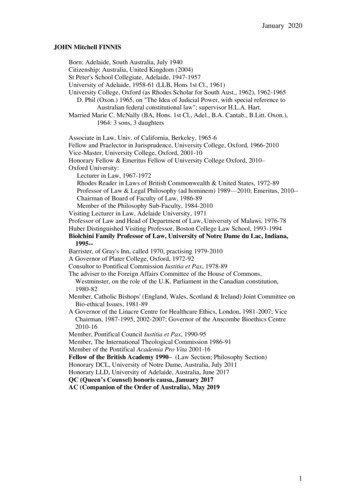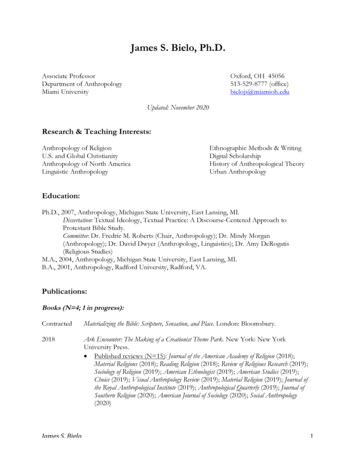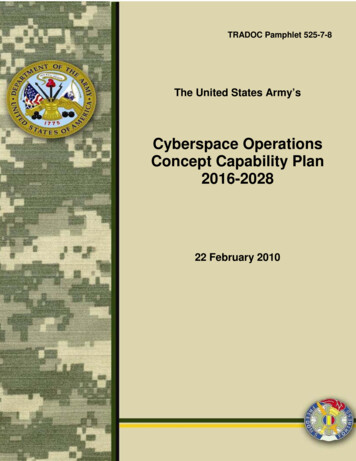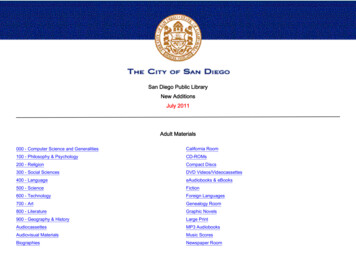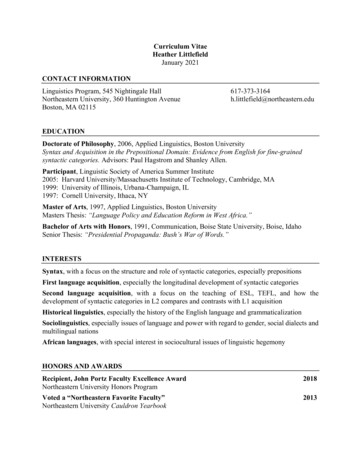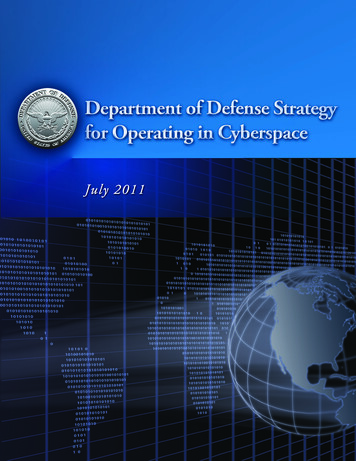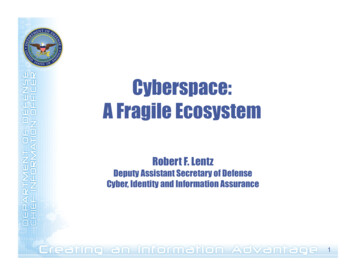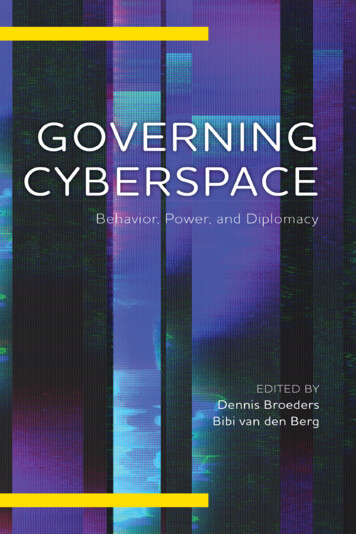
Transcription
Governing CyberspaceOPEN ACCESSThe publication of this book is made possible by a grantfrom the Open Access Fund of the Universiteit Leiden.Open Access content has been made available under aCreative Commons Attribution-Non Commercial-NoDerivatives (CC-BY-NC-ND) license.
Digital Technologies and Global PoliticsSeries Editors: Andrea Calderaro and Madeline CarrWhile other disciplines like law, sociology, and computer science have engaged closelywith the Information Age, international relations scholars have yet to bring the full analyticpower of their discipline to developing our understanding of what new digital technologiesmean for concepts like war, peace, security, cooperation, human rights, equity, and power.This series brings together the latest research from international relations scholars—particularly those working across disciplines—to challenge and extend our understanding ofworld politics in the Information Age.Governing Cyberspace: Behavior, Power, and Diplomacy, edited by Dennis Broeders andBibi van den Berg
Governing CyberspaceBehavior, Power, and DiplomacyEdited byDennis BroedersBibi van den BergROWMAN & LITTLEFIELDLanham Boulder New York London
Published by Rowman & LittlefieldAn imprint of The Rowman & Littlefield Publishing Group, Inc.4501 Forbes Boulevard, Suite 200, Lanham, Maryland 20706www.rowman.com6 Tinworth Street, London, SE11 5AL, United KingdomCopyright 2020 by Dennis Broeders and Bibi van den BergAll rights reserved. No part of this book may be reproduced in any form or by anyelectronic or mechanical means, including information storage and retrieval systems,without written permission from the publisher, except by a reviewer who may quotepassages in a review.British Library Cataloguing in Publication Information AvailableLibrary of Congress Cataloging-in-Publication DataNames: Broeders, D. (Dennis), editor. Berg, Bibi van den, editor.Title: Governing cyberspace : behavior, power, and diplomacy / edited by DennisBroeders, Bibi van den Berg.Description: Lanham : Rowman & Littlefield, [2020] Series: Digital technologiesand global politics Includes bibliographical references and index. Summary:“Contributes to the discussion of growing insecurity and the unpredictable and oftenauthoritarian use of the digital ecosystem”—Provided by publisher.Identifiers: LCCN 2020004795 (print) LCCN 2020004796 (ebook) ISBN 9781786614940 (cloth) ISBN 9781786614957 (paperback) ISBN 9781786614964 (epub)Subjects: LCSH: Computer networks—Law and legislation. Internet—Law andlegislation. Cyberspace.Classification: LCC K564.C6 G685 2020 (print) LCC K564.C6 (ebook) DDC 343.09/944—dc23LC record available at https://lccn.loc.gov/2020004795LC ebook record available at https://lccn.loc.gov/2020004796 The paper used in this publication meets the minimum requirements of AmericanNational Standard for Information Sciences—Permanence of Paper for Printed LibraryMaterials, ANSI/NISO Z39.48-1992.
ContentsAcknowledgments vii1Governing Cyberspace: Behavior, Power, and DiplomacyDennis Broeders and Bibi van den Berg1PART I: INTERNATIONAL LEGAL AND DIPLOMATICAPPROACHES2International Law and International Cyber Norms: A Continuum?Liisi Adamson3Electoral Cyber Interference, Self-Determination and thePrinciple of Non-intervention in CyberspaceNicholas Tsagourias45Violations of Territorial Sovereignty in Cyberspace—anIntrusion-based ApproachPrzemysław Roguski65What Does Russia Want in Cyber Diplomacy? A Primer854519Xymena Kurowska6China’s Conception of Cyber Sovereignty: Rhetoricand RealizationRogier Creemersv107
vi ContentsPART II: POWER AND GOVERNANCE: INTERNATIONALORGANIZATIONS, STATES, AND SUBSTATE ACTORS7A Balance of Power in CyberspaceAlexander Klimburg and Louk Faesen8International Law in Cyberspace: Leveraging NATO’sMultilateralism, Adaptation, and Commitment toCooperative SecuritySteven Hill and Nadia Marsan9Cybersecurity Norm-Building and Signaling with China145173187Geoffrey Hoffman1011Ambiguity and Appropriation: Cybersecurity and Cybercrimein Egypt and the GulfJames ShiresThe Power of Norms Meets Normative Power: On theInternational Cyber Norm of Bulk Collection, the NormativePower of Intelligence Agencies and How These MeetIlina Georgieva205227PART III: MULTISTAKEHOLDER AND CORPORATEDIPLOMACY121314Non-State Actors as Shapers of Customary Standardsof Responsible Behavior in CyberspaceJacqueline Eggenschwiler and Joanna Kulesza245Big Tech Hits the Diplomatic Circuit: Norm Entrepreneurship,Policy Advocacy, and Microsoft’s Cybersecurity Tech AccordRobert Gorwa and Anton Peez263Cyber-Norms Entrepreneurship? Understanding Microsoft’sAdvocacy on CybersecurityLouise Marie Hurel and Luisa Cruz Lobato285Index315About the Editors and Contributors323
AcknowledgmentsThis book resulted from the inaugural conference of the Hague Programfor Cyber Norms, titled “Novel Horizons: Responsible Behaviour in Cyberspace,” which was held in the Hague on November 5–7, 2018. The editorsthank the participants for a great conference and especially those that submitted their work for this edited volume.A first round of editorial comments was done for the conference itself,and we thank Liisi Adamson, Els de Busser, Ilina Georgieva, and Zine Homburger, who were at the time all affiliated to the program, for their editorialcontribution. We also thank Corianne Oosterbaan for all her hard work organizing the conference and her invaluable help with the editorial process.Lastly, we would like to thank the Dutch Ministry of Foreign Affairs whogenerously fund the Hague Program for Cyber Norms and all of its activitiesand publications.The Hague, 2.12.2019Dennis Broeders and Bibi van den Bergvii
Chapter 1Governing CyberspaceBehavior, Power, and DiplomacyDennis Broeders and Bibi van den BergWELCOME TO CYBERSPACEWhen states look at cyberspace, they do not necessarily see the same asmost end users do. Sure, they see the massive added value in terms of thedigital economy and, like their citizens, they have difficulties imagining lifewithout the constant interactions and communication that is the bedrockof modern digital society. However, many parts of the government seecyberspace increasingly as a source of threat, insecurity, and instability.Where states looked at the early stages of the development of cyberspacewith a certain degree of “benign neglect,” it became much more of a government interest when the digital economy started off in earnest. Now,states increasingly view cyberspace through a lens of security. Not justin terms of cybercrime but more and more in terms of the high politics ofinternational security (Klimburg 2017; Segal 2016; DeNardis 2014; Deibert 2013; Betz and Stevens 2011). Many states have formally declared thecyber domain to be the fifth domain of warfare—after land, sea, air, andspace—and increasingly states conduct intelligence and pseudo-militaryoperations in the cyber domain that fall short of “cyber war” but do createa permanent state of “unpeace” (Kello 2017; see also Boeke and Broeders2018). The increase in cyber-attacks among states, or at least those that comeout into the open, seem to be intensifying in terms of damage and impact,and provoke reactions from states and corporations. Cyber operations likeWannaCry and NotPetya, politically attributed to North Korea and Russia,respectively, were both damaging and indiscriminate, which added to thefeeling of vulnerability in the digital domain. However, even with NotPetya,of which the global damages have been estimated at roughly 10 billion(Greenberg 2018), no state was willing to say this operation was in violation1
2Dennis Broeders and Bibi van den Bergof international law. More in general, all public attributions of cyberattacksto states have not invoked international law other than in the most generalterms possible (Efrony and Shany 2018).In cyberspace, a state of unpeace is heating up and although most statesagree in principle that international law applies in cyberspace as it doesin the analogue world, they do not seem to be able to agree on specifics.Furthermore, “the” regulation of “the” Internet does not exist. Nye (2014)has shown that the Internet is regulated through an elaborate cyber regimecomplex that has pockets of dense regulation in some subject areas as wellas patches that are largely unregulated. Moreover, there are many aspectson which states are still struggling to find an effective governance structureto address the issues at hand (see also Klimburg and Faesen 2020 in thisvolume). Moreover, some elements of governance are firmly in the hands ofprivate parties (companies, the technical community), whereas others—forexample, military, intelligence, and diplomatic—are firmly in the hands ofstates. The mix between public and private actors in Internet governanceis called “multistakeholder governance,” a concept that is embraced byWestern liberal states (at least in theory) but is disputed by states that favora much stronger role for sovereign states in the regulation and governanceof cyberspace. States like Russia and China would like to bring “Internetgovernance” into a multilateral setting where sovereign states, ratherthan a wide array of stakeholders, steer the direction of cyberspace. Thisarchetypical divide between multistakeholderism and multilateralism whentalking about cybersecurity and Internet governance structures is connectingwith rising geopolitical tensions between the major global powers. The globalstrife between the United States and China and Russia—with the EuropeanUnion somewhere in the middle of the mix—works as a force multiplierfor tensions in both interstate behavior—cyber operations among states—and positions in diplomatic negotiations on “responsible state behavior”in cyberspace (Broeders, Adamson, and Creemers 2019). In this volume,Klimburg and Faesen (2020) search for ways to square the circle the betweenclassic balance of power politics and the complicated governance structuresthat are needed to regulate cyberspace.OF LAWS AND NORMSThe possible negative effects of the use of ICTs for international peaceand security were flagged by Russia in 1998 when it submitted a resolutionon “Developments in the field of Information and Telecommunications inthe context of International Security” to the UN’s First Committee, whichdeals with disarmament and international security (UNGA 1999). While
Governing Cyberspace3recognizing that the Internet brought many good things, Moscow feared anarms race in this new domain and aimed for the negotiation of a treaty thatwould ban the use of information weapons in order to prevent informationwars. To some extent, Russia feared in 1998 what many now consider Moscow to be the best at: information operations and the spread of disinformation. Russia was aiming for a new treaty specifically for cyberspace but raninto Western resistance to the notion that cyberspace needed lex specialis.Western states, in this field often loosely assembled under the heading ofthe “like-minded” states, depart from the notion that international law,including International Humanitarian Law, applies in the digital domain asit does in the “real world.” The UN Group of Governmental Experts (UNGGE) process was started in 2004 to create a venue at the UN level fordeliberation of the issue without going down the road of a treaty. Out of fiveiterations of the process the group of experts produced a consensus reportthree times, with as main yields the principle that international law appliesin cyberspace in 2013 and the formulation of a number of nonbinding normsfor responsible state behavior in the 2015 consensus report (UN GeneralAssembly 2010, 2013, 2015). After the 2017 round of the UN GGE failedto achieve consensus, there were many reports of the “death of the normsprocess” (see, e.g., Grigsby 2017), but in November 2018, the UN GeneralAssembly voted on two parallel and competing resolutions. The first wassubmitted by the United States and supported by the “like-minded” statescalling for a new round of the GGE. The second was submitted by Russiaand called for an Open-Ended Working Group (OEWG) to discuss roughlythe same issues. Both were voted through by the General Assembly in substantial and significantly overlapping numbers, and the twin processes havestarted in 2019.In a parallel trajectory to the diplomatic processes at the UN and regionalorganizations, international legal scholars embarked on a project to fleshout how exactly international law applies in cyberspace. This project underthe sponsorship of the NATO CCDCOE—which does not make it a NATOproject—resulted in the Tallinn Manual (2013) and the Tallinn Manual 2.0in 2017 (Schmitt et al. 2013, 2017). Both are academic, nonbinding studieson how international law applies to cyber conflicts and cyber warfare and onmany issues contain majority and minority opinions. The first manual focuseson the jus ad bellum and International Humanitarian Law and the secondfocuses on cyber operations that are “below the threshold” of armed conflict,or “peacetime operations.” The Tallinn manuals are the most comprehensiveanalyses of International Humanitarian Law and cyberspace available andserve as an important reference point. However, and as indicated before,states are reluctant to refer to (specific principles of) international law whenthey publicly address cyber operations and conflict, leading Efrony and
4Dennis Broeders and Bibi van den BergShany (2018) to refer to the manual as “a rulebook on the shelf.” Many legalscholars in this fieldwork on different aspects of international law and howthese relate to state operations in the cyber domain. In this volume, Roguski(2020) analyses the principle of territorial sovereignty in cyberspace througha lens of an “intrusion-based approach” and Tsagourias (2020) looks at cyberinterference with election processes in light of the legal principle of nonintervention. Principle-by-principle and case-by-case legal scholars are adding to the growing literature on the application of international law to statebehavior in cyberspace.The limited diplomatic progress on the application of international law tocyberspace also led to what is called the cyber-norms process, both in diplomatic practice as in academia. The 2015 UN GGE consensus report includeda section on “general non-binding, voluntary norms, rules and principles forresponsible behaviour of states.” This section contained eleven “new” recommendations for norms and gave an impetus to the international debate aboutcyber norms. These norms are often juxtaposed with international law. Thestates that participate in the GGE process went the route of norms, in partbecause achieving agreement on the question of how exactly international lawapplies to cyberspace proved a size too big for the negotiations. However, itis also misleading to set norms and international law totally apart from eachother in this domain. In this volume, Adamson (2020) highlights the factthat many of the norms in the 2015 UN GGE report actually reflect existinginternational law. Norms and international law can and do mutually reinforceeach other and should not be seen as two completely different and paralleldiscourses.International law and international norms—as well as Confidence Building Measures (CBMs), which are also part of the GGE process—all servethe same basic function in the context of cyberspace. They are all meantto make state behavior more predictable—especially in times of conflict—when operating in a context that is unpredictable and where actions areeasy to obfuscate and misinterpret. Norms and international law serve toset benchmarks against which we can measure and evaluate state behaviorand call actors out on bad behavior. International law would be the goldstandard for this but is problematic for two reasons. Firstly, because it hasproven hard to get substantial agreement on the question of how specificprinciples of international law apply in cyberspace. Secondly, becausemany of the cyber operations that have states worried are below-thethreshold operations and, moreover, they are usually executed by intelligence agencies and proxy actors, which are not meaningfully regulatedby international law in the first place (Boeke and Broeders 2018; Maurer2018). In order to make some progress, academics and states have gonedown the route of norms.
Governing Cyberspace5THE CYBER-NORMS DISCOURSENorms have been a part of the academic debate for far longer than the riseto fame of the cyber-prefix. In international relations theory, Peter Katzenstein’s definition of a norm is often the point of departure. Accordingto him, a norm in international politics is “a collective expectation for theproper behaviour of actors with a given identity” (Katzenstein 1996, 5). Thisimplies that there is some sort of community that has—or develops—an ideaof what appropriate behavior is. And even though there is no enforcementmechanism in place, the community expects its members to behave a certain, appropriate, way. In the cyber-norms discourse that community is oftenequated with states, especially in the diplomatic, state-led norms debate,even though many other public and private actors populate the cyber domainand even dominate important aspects of Internet governance. Finnemore andSikkink (1998) argue that norms are often championed by a norms entrepreneur and when successful the norm they champion goes through a normscycle. This cycle starts with “norms emergence,” in which the role of thenorms entrepreneur(s) to propagate the norm is vital. If their advocacy forthe norm is successful, the community to which the norm should apply mayreach a tipping point which leads to the second stage, labeled the “norms cascade.” During this phase, the pioneering work of the norms entrepreneur getstaken over by many other actors within the community who see the normsas central to their identity and propagate its spread. In the last stage, actors“internalize” the norm into their everyday behavior and the norms effectively come to serve as a benchmark for appropriate behavior. Finnemoreand Hollis (2016) have taken this classic approach to norms creation into thecyber domain and highlighted the dynamic and interdependent character ofcyber norms. They also found that much of the debate about norms in thisdomain was (too) centered on norms as an end goal and not enough on thevalue of the process itself. Kurowska (2019) takes that argument further andemphasizes that the classic model of the norms cycle—perhaps especiallyin the cyber-norms debate—often has a teleological character and does nottake norms contestation into account as an important part of the model. Thisblind spot has consequences not only for the empirical analysis of the normsprocess but also for the legitimacy of the norms process as a political anda policy process: “a norm that cannot be contested, cannot be legitimate”(Kurowska 2019, 8).Cyber norms as they stand today are highly contested among governments,despite the efforts of diplomats over the last decades. Moreover, the community to which the norms apply—and who feel part of it as norm entrepreneurs—is by no means convincingly demarcated. States consider themselvesto be the core community, but civil society and corporations are increasingly
6Dennis Broeders and Bibi van den Bergvocal about their place and role in this normative and regulatory domain andengage with the norms debate on their own accord. In this volume, Eggenschwiler and Kulesza (2020) analyze the role of a number of civil society andcorporate initiatives that engage with, and shape the norms debate. Gorwaand Peez (2020) and Hurel and Lobato (2020), both also in this volume, analyze the role, goals, and strategies of Microsoft that has put itself forward asa major actor in the international cyber-norms debate.However, the diplomatic track does not easily open up to “outside” actorseven when it has failed to make much substantial progress on the issue. The2015 UN GGE norms may be agreed upon but are in the words of Maurer(2019) “considered voluntary, defined vaguely, and internalized weakly.”After the attacks on the Ukrainian grid in December 2015, many wonderedwhy this was not called out as a violation of the norm that states do not attackcritical infrastructures in peacetime as formulated in the 2015 UN GGE consensus report.1 Now that the stalemate that came into being after the 2017round of the UN GGE failed to produce consensus has been replaced with thepolitical surprise of the creation of two UN processes in 2018, states bear agreat responsibility for moving the process forward. If they do not, the UN isunlikely to remain the focal point for discussion. And while the United Statesis heavily invested in the GGE as a format and Russia is heavily invested inthe OEWG, and more generally in the idea of a multilateral approach, thedifferences of opinion remain substantial.Meanwhile, cyber norms are also emerging through state practice ratherthan diplomatic agreement. States engage in certain behavior in cyberspace:they conduct cyber operations, develop (military) cyber doctrine, changecybersecurity policies and thus create new facts on the digital ground. Statesalso draw red lines that are either respected or violated. When violated, someare met with consequences and some are not. All of this is norm-settingbehavior. Actual state behavior shapes normative behavior but is “implicit,poorly understood, and cloaked in secrecy” (Maurer 2019). A good exampleof that is the norm-setting behavior of intelligence agencies that is analyzedby Georgieva (2020b) in this volume (see also Georgieva 2020a). Power relations and actual state behavior go a long way in explaining how state relationsin cyberspace develop.POWER AND NORMSOne complicating factor of state relations is the Orwellian notion that allstates are equal, but some are more equal than others. Even the UN, anorganization founded on the principle of the equality of sovereign states,acknowledges this through the mechanism of the five permanent members of
Governing Cyberspace7the Security Council that hold a veto. As “cyber” rose to the top of the international and national security agenda, geopolitics and strategic considerationsbecame more prominent in the debate about responsible state behavior incyberspace. States may agree that cyberspace is a source of threats to nationalsecurity, but simultaneously it is also a possible strategic military advantage,especially to the top-tier cyber powers. Powerful states are usually reluctantto give up capabilities, especially when it is uncertain that others will do thesame (Broeders 2017). Countries like the United States, China, Russia, theUnited Kingdom and Israel, but also Iran and North Korea, have investedheavily in military and foreign intelligence capacity to operate in cyberspace.Other countries have followed suit in different degrees creating a landscapein which operational cyber capacity and cyber power are unequally dividedamong states.Moreover, in recent years, the global balance of power has been shifting. American global dominance is challenged by the rising star of China.While China’s cyber power is still mostly focused on (economic) espionageand control on the domestic information sphere, rather than all-out militarycyber power, China is also asserting itself as a tech developer and vendorat the global level as one of the underpinnings of its status as an economicsuperpower (Inkster 2016). Russia is trying to reassert itself in terms of beinga key player in international cyber peace and security. In cyberspace it doesso by—allegedly—being one of the most active cyber powers operatingbelow the threshold of armed conflict in the networks of a great number ofcountries, as well as by being one of the leading countries in the diplomaticprocesses on responsible state behavior in cyberspace (see Kurowska 2020 inthis volume). China and Russia are also formally and informally aligned ona number of foreign policy objectives, including in the cyber domain. Theypresent a seemingly united front to the world, largely aimed at countering UShegemony, but underneath the façade of unity there are also structural differences that may put cracks into Sino-Russian cooperation in the longer run(Broeders, Adamson, and Creemers 2019).As a general principle, all states want other states to be bound by a framework of rules while retaining as much room to maneuver for themselves.Great powers like strategic ambiguity in military affairs (Taddeo 2017) andexceptionalism in political affairs. To global powers, like the United States,China, and Russia, the latter is almost an informal doctrine: they all apply asense of exceptionalism to themselves. China and Russia have clear, explicit,and extensive rules and regulations with regard to cyberspace for their ownterritories, and (global) companies wishing to do business there must complyor else face the consequences. In this volume, Hoffman (2020) analyses theways in which China has dealt with US pushback on freedom of expressionsurrounding Google’s entry into the Chinese market.
8Dennis Broeders and Bibi van den BergRussia and China both rally around the idea of “cyber sovereignty” asone of the main organizing principles for interstate relations in cyberspace(see Creemers 2020 and Kurowksa 2020 in this volume). To these countries, cyber sovereignty means control over the domestic information sphereinternally, and strict adherence to the principle of non-intervention and selfdetermination externally. Both China and Russia see information operationsin their nation’s information sphere as the greatest ICT-related threat. Ironically, what Moscow fears most is what it is generally considered to be bestat: information operations and the spread of mis- and disinformation. Morein general, “sovereignty” is a bone of contention between Western states andauthoritarian states. In this volume, Creemers (2020) highlights that tensionin the Chinese case: “China’s definition of sovereignty primarily concerns theintegrity of its political structure, while Western states consider this a defenceof exactly those abuses that the more conditional, post-Cold War reading ofsovereignty sought to curtail” (Creemers 2020, 112). Moreover, for countrieslike China and Russia, sovereignty is not the same for all states: the sovereignty of great states is of a different order than those of smaller states. Greatpower status is paired with exceptionalism. In the eyes of both Russia andChina, the Pax Americana was built on American exceptionalism—“do as Isay, don’t do as I do.” Their (rise to) great power status will likewise be builton the idea of exceptionalism, which in turn will influence their views androle in disrupting, reforming, and building the future world order (Broeders,Adamson, and Creemers 2019). The cyber order will be shaped by greatpower politics, which is currently and for the foreseeable future in flux.It is also interesting to see how less powerful states seek to navigate thepower divides in cyberspace, aligning themselves with one power block onsome issues, while choosing to align themselves with a competing powerblock on others. In this volume, Shires (2020) looks at states in the MiddleEast—a complex region with multiple allegiances on different issues—and shows how “their regulations, laws, and participation in internationalinstitutions places them with Russia, China, and other proponents of cybersovereignty; on the other, their private sector cybersecurity collaborations,intelligence relationships, and offensive cyber operations are closely alignedwith the USA and Europe” (Shires 2020, 205–206). For many countries thendetermining their position on security, international law, and norms is oftenan undertaking characterized by a degree of ambiguity.In the practice of everyday cyber diplomacy, the inequality between sovereign states often means that smaller states favor and support the developmentof a rules-based order, engaging, for example, in cyber-norms entrepreneurship (Adamson and Homburger 2019), while larger states engage with theseprocesses but allow themselves at least a certain degree of strategic ambiguity. Russia and the United States may be the primary instigators of the UN
Governing Cyberspace9processes that seek to define how international law applies in cyberspace andwhich cyber norms could help shape state behavior, they are also the statesthat shift the posts on these issues through their actual behavior and advancesin national (military) doctrine and operations. In terms of espionage (NSAmass surveillance, Chinese economic espionage, Russian digital sabotage),the “militarization” of cyberspace (building up military cyber commands)and the return of information operations (Russian influence operations, mostnotably interference with the 2016 US presidential election) it has been statepractice, not laws and rules, that set the tone. Development in military cyberdoctrine in some of the top-tier countries also points in the direction of amore aggressive posture in cyberspace. For example, the US Department ofDefence (DoD) cyber strategy states that US cyber forces are in “persistentengagement” with their adversaries and, therefore, need to “defend forward”and “continuously contest” those adversaries, creating more possibilities forescalation of cyber conflict, even though the intention may be the opposite(Healey 2019). States interpreting the actions and intentions of other stateserroneously is a classic source of instability as it can lead to the unintendedescalation of conflict, a dynamic captured by the idea of the classic securitydilemma (Jervis 1978). As Buchanan (2016) has shown, cyberspace providesan excellent context for what he calls a cybersecurity dilemma, highlightinghow misinterpretation and escalation of conflict in cyberspace may emergeeasi
v Acknowledgments vii 1 Governing Cyberspace: Behavior, Power, and Diplomacy 1 Dennis Broeders and Bibi van den Berg PART I: INTERNATIONAL LEGAL AND DIPLOMATIC APPROACHES 2 International Law and International Cyber Norms: A Continuum?19 Liisi Adamson 3 Electoral Cyber Interference, Self-Determination and the Principle of Non-intervention in Cyberspace 45
